Boosteroid is a Ukrainian cloud-based gaming platform that makes it possible to play AAA projects on a low-powered PC or TV without any additional consoles, and you can even play Cyberpunk 2077 on your Android smartphone if you like. All you need is a stable Internet connection at speed of 15 Mb/sec. For Ukrainians, the advantage is that the servers are located in Kyiv, which minimizes the data transfer delay. And back in March, Here we go! Microsoft signs a 10-year deal with Boosteroid, a Ukrainian cloud gaming platform with Boosteroid. For Boosteroid team it is a signal that some big publishers already consider cloud gaming as the future of gaming industry.
But how does it all work? Can cloud gamming replace consoles and PCs? When will people actively move to the cloud, how popular is cloud gaming right now, and why Google cancelled its cloud gaming service Stadia? The editors of gg talked to Vladyslav Kosmin and Artem Skoryi, who are responsible for business development at Boosteroid.
gg: Can you explain what cloud gaming is for those who don't know at all what it is? What are the benefits of cloud gaming for the user?
Artem Skoryi: In very simple words, cloud gaming is a streaming service like Netflix or Spotify, but for games. The user opens Boosteroid, chooses the game he wants to play, and it launches in his browser or app without any updates or downloads. The game runs on a remote server which has enough power to render the video game, and the video and audio of the game are streamed from the server to the user's device, and the keyboard and mouse controls are streamed back to the server from the user's device to directly control the gameplay.

Artem Skoryi, Boosteroid: "Cloud gaming is like Netflix or Spotify, but for games"
gg: On which devices can you run Boosteroid?
Artem Skoryi: Generally it's almost any PC, smartphone, tablet or TV. We have a web-version where all possible browsers are supported. First of all, this was the development goal. We wanted to create a solution where users can play in a browser so that they don't have to install any applications or download anything, but make it as easy as possible to access the games.
But now there are already native applications for virtually all operating systems: an application for Windows, for macOS, for Linux - that is, if we are talking about the PC version. There's also an app for Android smartphones and there are apps for most operating systems on Smart TV: Android TV, webOS (that's LG), and Tizen (that's Samsung).
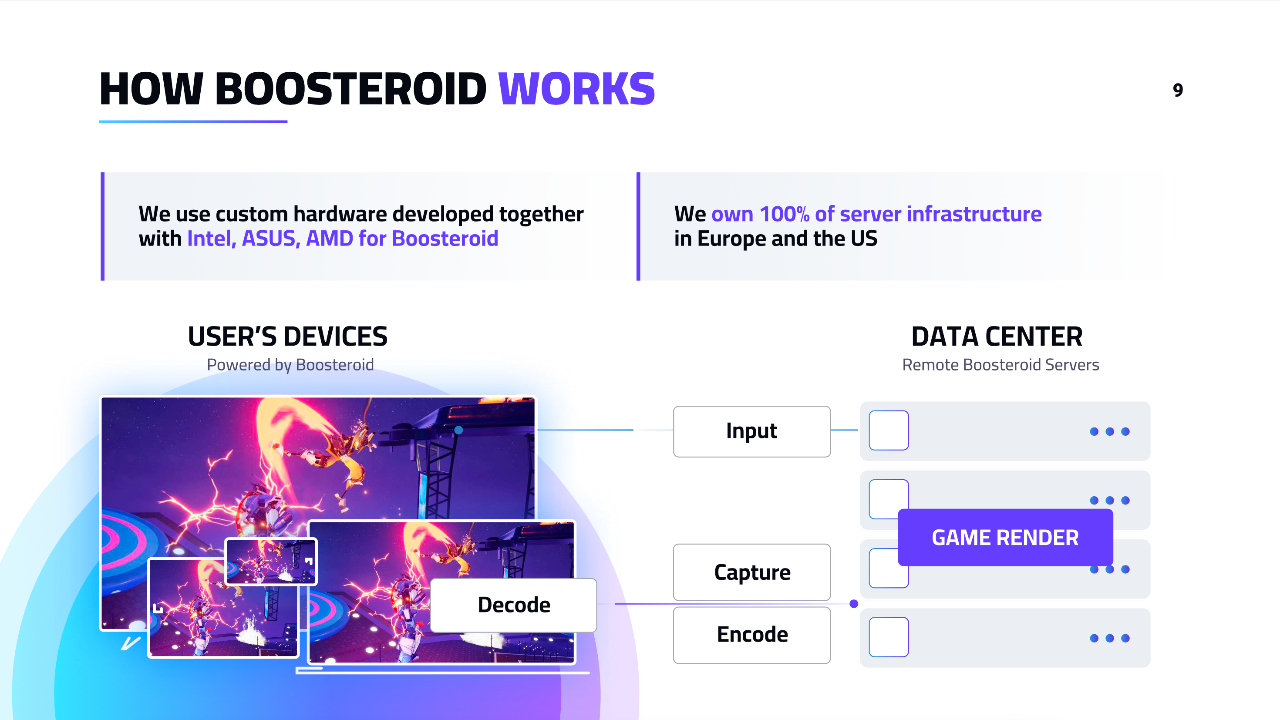
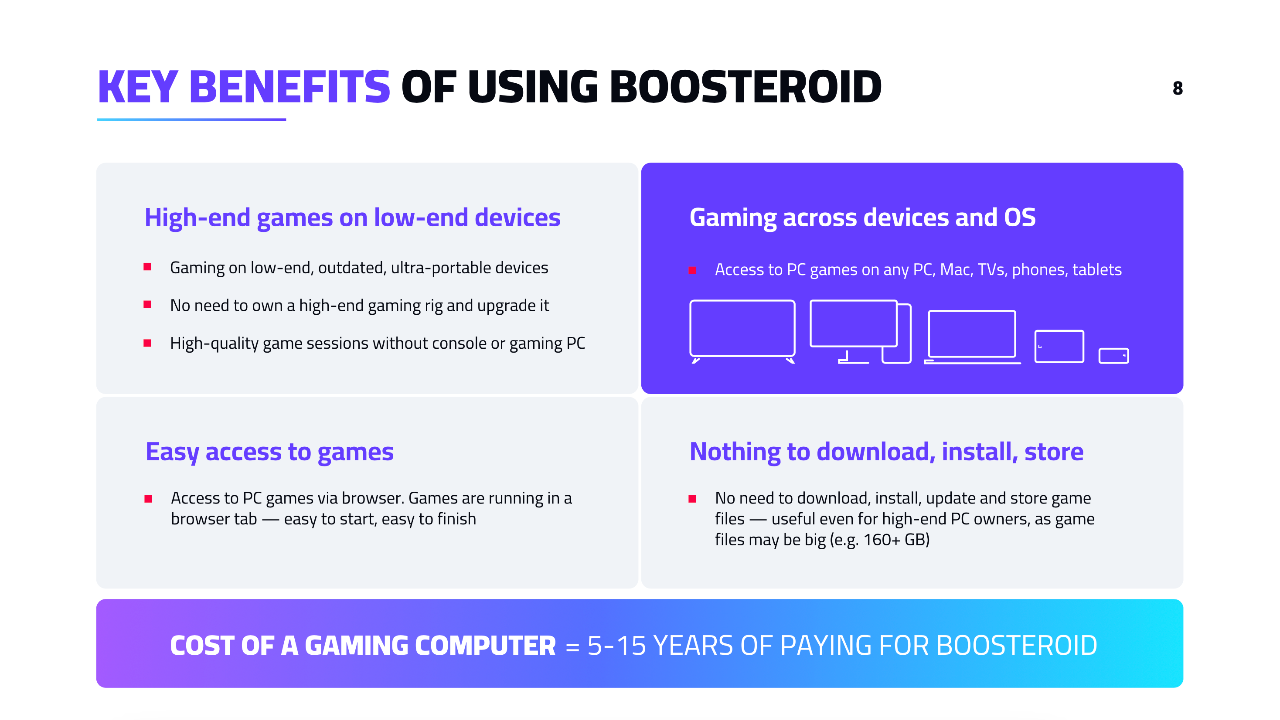
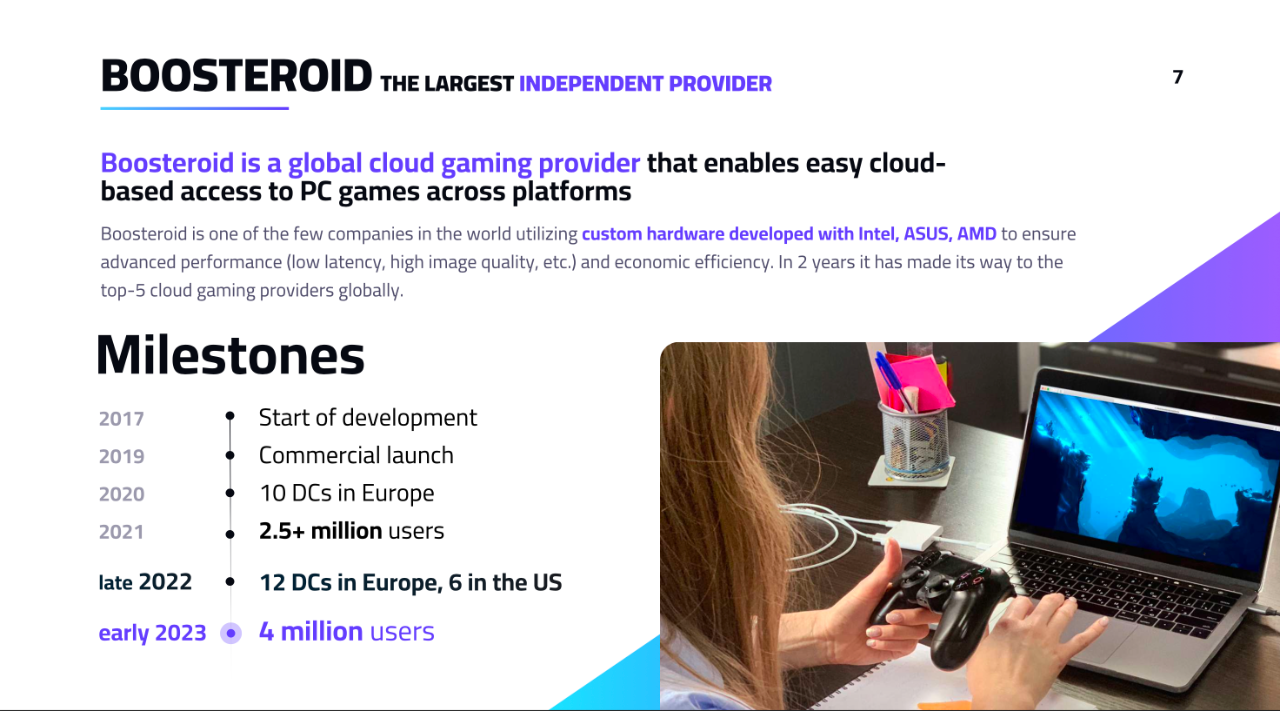
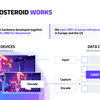
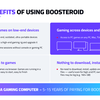

Slides from Boosteroid presentation: 1. scheme of how the cloud gaming service works. 2. Benefits of cloud gaming (e.g. the cost of a gaming computer corresponds to 5 to 15 years of using Boosteroid). 3. Growth of the service audience: now Boosteroid has more than 4 million users.
gg: How powerful connection is needed to use Boosteroid? What technical features do users need to know?
Artem Skoryi: Right now we have minimum requirements for connection quality and speed. 15 Mb/sec for the user to receive video images in Full HD resolution and 60 frames per second is a minimum. For a more stable and better picture quality, connection speed requirements can be as high as 25 Mbps. However, even at 15 MB/s, users get Full HD and 60 fps images.
Regarding technical requirements, it is important to understand that it must be a stable connection. The user's network must not be overloaded, there must not, for example, be three films on a torrent, and there must not be 10 devices connected to a given network at the same time. It is also important to pay attention to what type of connection the gamer is using. If it is Wi-Fi, the picture quality may vary, depending on the network frequency, as 2.4 and 5.0 Hz Wi-Fi networks have different bandwidths. And if you have a cable connection, there will be more stable speeds, which is important for cloud gaming.
gg: How did you get the idea to go into cloud gaming in Ukraine?
Vladyslav Kosmin: The idea to go into cloud gaming came first of all from the concept of availability of software on devices that can't use this software because they are too weak.
That is, this idea is not just about games, it is about any software product.
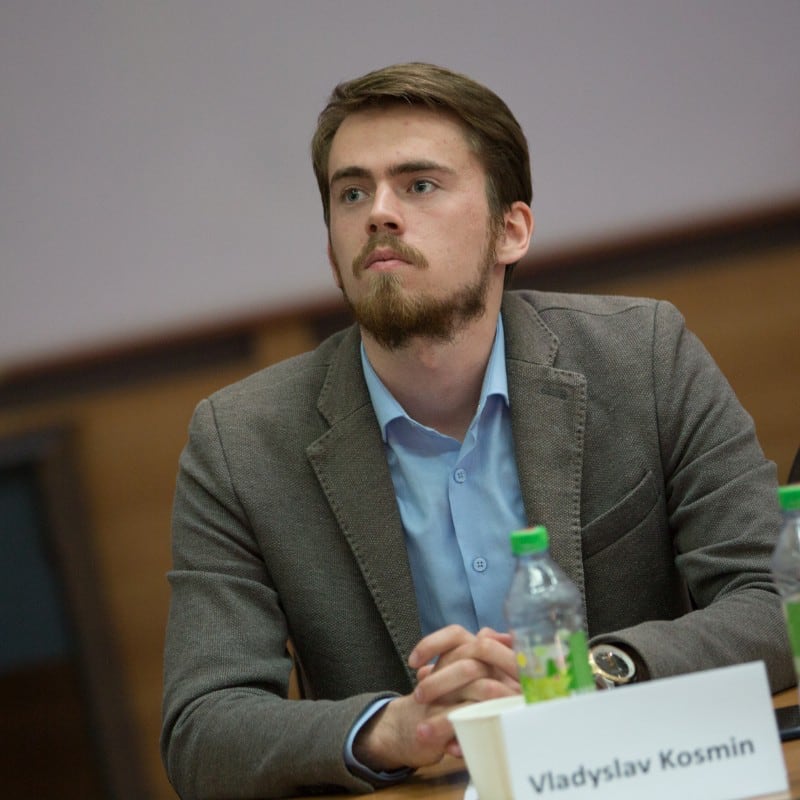
Vladyslav Kosmin, Boosteroid: "A very large amount of technology is inaccessible to people and small businesses because there is no way to equip everything with devices that can handle powerful software products.
In 2017-2018, we actively researched this issue and came up with all the necessary streaming solutions. First of all, we developed server solutions, which were created together with Asus, Intel and AMD. It is their hardware that we now use for cloud gaming.
gg: What challenges did you face while developing such business in Ukraine? Which problems were unexpected and unpredictable (apart from the war, of course)?
Vladyslav Kosmin: There were no unexpected and unpredictable problems. There are predictable problems - technical issues. Conceptually, we are now living in the world that in many ways is not adapted to cloud gaming, neither data networking protocols, nor games themselves. When all this was created, no one even thought about cloud gaming, and we exist in a technological environment that is not very cloud gaming friendly. You have to customize a lot of things, you have to be creative to make a good product in that technical environment.
gg: And how did the name Boosteroid appear?
Vladyslav Kosmin: There's no fairy tale. The name appeared by itself. From the very beginning we had a logo that was based on the theme of space and rockets, so "Boost" in here equals "To speed up".
gg: Which players are there in this market now - in the world and in Ukraine?
Vladyslav Kosmin: In Ukraine, we are the only service that has placed the infrastructure inside the country. Why is this important: it provides fast and stable connection throughout Ukraine, because if you take our competitors, the user will connect, for example, in Frankfurt, while our servers are located directly in Kyiv. During the time when signal goes from user to the server, it is being processed, decoded, encoded again and when the signal after all these manipulations reaches the user, a long period of time passes. And in Boosteroid the delay for Ukrainian users is up to 15 milliseconds.
gg: Where are the servers located other than Kyiv?
Artem Skoryi: We have 6 spots in the US. Thus we cover the entire territory of the USA, Mexico and Canada. As for Europe, we have servers in countries such as Ukraine, Romania, Sweden, Serbia, Slovakia, Spain, Italy, the UK and France. Some countries have 2 data centers. This allows the game to be played in any country in Europe with a delay of up to 20 milliseconds, providing users with a good and stable image from their desired game. If we consider an offline game, the user will get a good image even when the latency reaches more than 20 milliseconds.
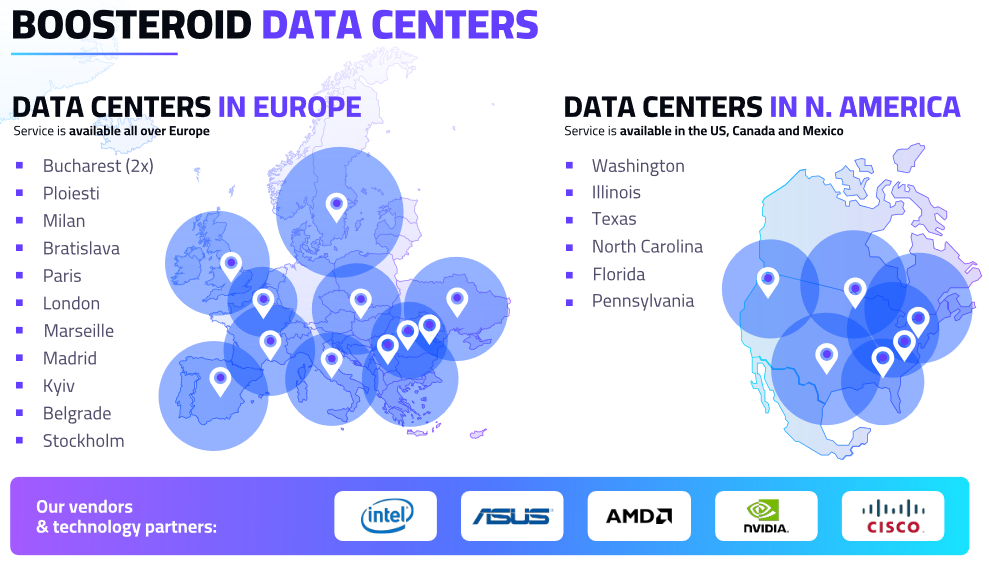
gg: What other benefits does Boosteroid have?
Vladyslav Kosmin: If you buy a subscription, you get unlimited access to the service. You can play whenever you want, even 24/7, although we certainly don't recommend it for the sake of our users' health. There are games where the session can last 8 hours or even more. With many competitors, even if you buy a premium subscription, you will be disconnected from the server after a certain time and your session will end.
Also, we have a hybrid model of accessing content: some games are already installed on the servers, so you just open Boosteroid, choose a game and it launches immediately. But you can also download some games yourself that you bought from an official distributor, because you're given a remote computer along with your subscription. You can therefore play games that are not available on most platforms, as some publishers still don't want their games to be available in cloud gaming services libraries.
For us, cloud gaming is the new computer. Now your computer is on a remote server, but conceptually nothing changes.
We believe that the user is free to choose where he runs his game, which he bought and actually owns. Whether he wants to run it on a physical PC or on a remote PC makes no difference to us.
Some companies in the market share our point of view, some do not, but it's just a matter of time.
gg: Why do some publishers strongly not support cloud gaming?
Vladyslav Kosmin: It may depend on some kind of strategic thinking of one company or another, but there are already publishers who see cloud gaming as inevitable future. What happened with movies and music will happen with games, because all these types of content are moving to streaming, where you don't need to download anything, store anything locally on your computer. We have already gone through all that with Netflix, Spotify, and other similar services.
While cloud gaming isn't the dominant way to access games right now, most users are still downloading games to their PC, but it's a very growing market, and all of our partners, including Google, Microsoft and LG, understand that, and are moving in that direction.
90% of all gamers will move to the cloud in their early 30s.
Although it all depends on market readiness and infrastructure, including internet infrastructure in a particular region. So somewhere the full transition of gamers to the cloud may happen in 5 years, somewhere in 10 years.
Soon publishers will have no other choice but to go to the cloud, and technology is developing rapidly. Just 3 years ago we might have been told, "This is all very cool, but the image quality is not great". Now cloud gaming provides very high quality.
You have to understand that the cloud opens up a new audience for any publisher. These are owners of low-powered PCs and portable devices, devices with other operating systems like Linux, macOS and the like. Google understands this when it releases a Chromebook where you can't run a single game, but only through cloud gaming.
gg: Why did Google shut down its cloud gaming project Stadia? What went wrong with it?
Vladyslav Kosmin: We really liked Stadia, but it didn't go well for many reasons. The first one is that, in fact, within the framework of this service, the user was closed and had no opportunity to use the games that he already had. For example, I have some game that I have been playing for years. I want to play it in the cloud. And I have a choice: go to Boosteroid where I can activate my account and play, or go to Stadia where I have to buy the game again because they had a Stadia Store there and if I already bought the game somewhere else I can't "bring" it to Stadia and play in their cloud.
Apparently the calculation was to make the ecosystem closed with users who wouldn't go anywhere else but Stadia, but it didn't work. Why? Because the audience that needs it now is the audience that already has some games, and who are much better off interacting with a service that works on a model where you bring your games and play. Also, if you've already purchased a game from Stadia, you won't be able to play it anywhere else except on their service.
For example, if you don't have internet, you can close Boosteroid and run the game locally. With Stadia this was impossible, even with story games.
There were also technical reasons. Stadia didn't look like what was announced in all the presentations, people didn't get exactly what they were promised. Also, the market situation had an impact. For example, the coronavirus, although it brought someone a new audience, still had a bad effect on the markets as a whole, and together with many other economic factors all had a negative impact on various companies. If you have a lot of products but less money coming in, then something has to be closed. If it were 2018, Stadia would probably continue to exist. But for the past few years, there has been a set of circumstances that have not been conducive to that.
Actually, we were sorry when Stadia was shut down because it was an interesting and promising product.
gg: You see the market from the inside, when do you expect the peak point after which everyone will migrate to the cloud en masse?
Vladyslav Kosmin: It has been about a year since the market as it is now. The services that chose a bad business model at the beginning of cloud gaming - exist no longer. The only ones here now are those who have figured out how to get it right. Within 2-3 years, and then there will already be a clear picture.
Right now, many leading companies are encouraging gamers to move to the cloud. For example, LG, Samsung, and others are introducing a gaming interface for their televisions.
Generally speaking, we are proud of the fact that we are also making an effort to do so. And whoever will write the history of the video game industry years from now will also write about us, because we are actually one of the largest and fastest growing services now.
gg: Is your application already installed into LG or Samsung TV sets that are sold in Ukraine?
Artem Skoryi: If we take Philips, Sharp, Skyworth and LG, our application is installed on all the TV sets from a certain year of production. Of course, if these TV sets have already been sold, the application will not appear there until the user installs it himself or performs the software update. As for Samsung, we have not officially launched our app yet but we plan to. Now the Boosteroid app is already available on more than 30 million devices on Android TV and webOS TV.
gg: You had a collaboration with KIVI TVs, was it successful for you?
Vladyslav Kosmin: The case with KIVI was quite interesting. Boosteroid is not just installed on TVs, but integrated with KIVI's ecosystem and interface. And it's very cool that a TV can now become a gaming machine.
For us it was fantastic to be able to run AAA games on a TV without any additional devices. We saw confirmation of our theses about the effectiveness of such access.
Generally speaking, part of our strategy from the very beginning was to launch a service that we call "Big Screen gaming". We produced the necessary technical solutions with the aim of having a very good solution for big screen gaming.
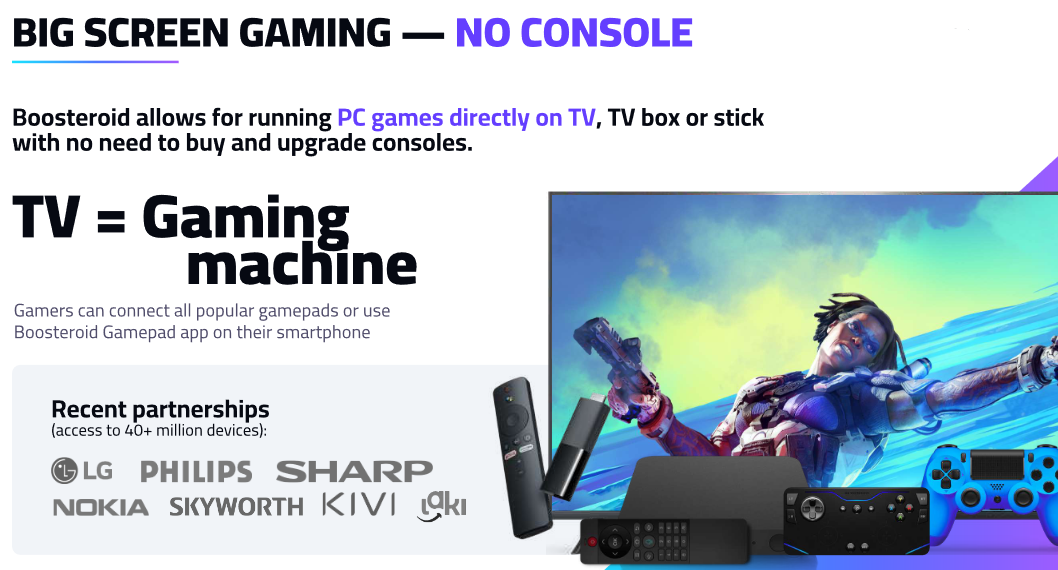
gg: What share of gamers is playing from TVs?
Vladyslav Kosmin: The global share of users who use Boosteroid on TV is 7%. We see this share growing thanks to such collaborations. In the long term, it may grow up to 30%. We are not encroaching on consoles, of course, that is sacred. But cloud gameplay is already replacing the console, because why buy one when one TV is enough? In 7-10 years the vast majority of console gamers may move to the cloud.
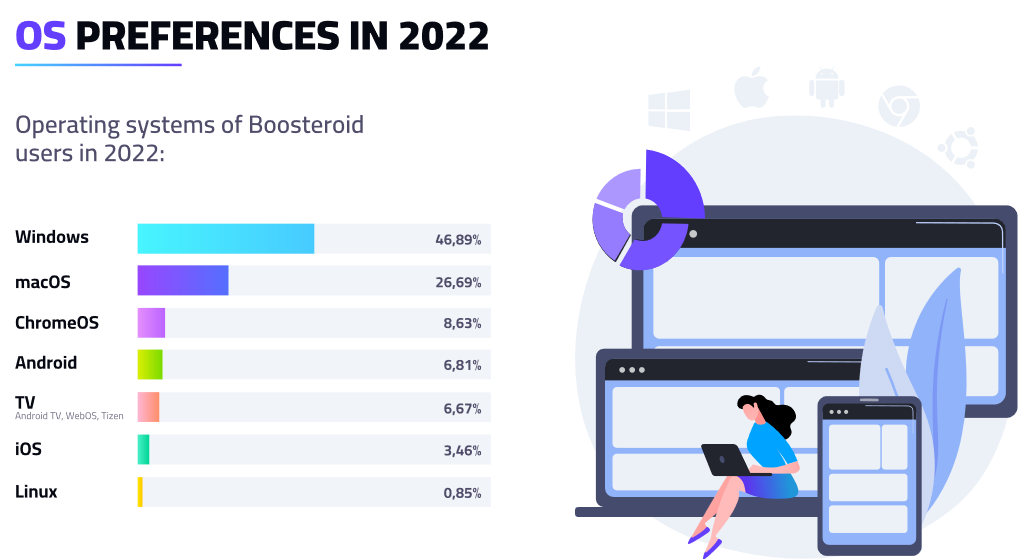
gg: Aren't you afraid that with games it will be the same as with movies, when the user in the US has to pay separately for Netflix, Disney+, HBO MAX and other streaming services? Won't it be the case that console players will create their own cloud services?
Vladyslav Kosmin: Theoretically, this situation is possible. Of course, this is not very pleasant for the user, but in my opinion, there is no situation in the market where anything is developing not as it should.
The users will simply choose what they like, what is available to them and what they want to play. It will be healthy competition for the services.
gg: You made a 10-year agreement with Microsoft. What kind of future does it open for Boosteroid?
Vladyslav Kosmin: It opens perspectives for the whole market, because Microsoft provides wide access to its content in the cloud. It is an outstanding event for the whole industry. We, in turn, will be able to offer users a large library of games in the cloud. If the agreement between Microsoft and ActivisionBlizzard goes through, imagine being able to run Call of Duty in 2 clicks on any platform or play Microsoft Flight Simulator, which is quite hardware-hungry.
We want this to become a trend and make more and more games available to a wider audience. What Microsoft is doing is an example of the kind of world we are building and want to see for gamers.
gg: A press release from Microsoft states that two offices in Kharkiv were damaged during the full-scale invasion. How else did the war affect your work?
Vladyslav Kosmin: It has become more difficult with logistics; it is now harder to get new equipment. We also wanted to launch in Latin America, but it is impossible now. Therefore, we will develop in the markets where we exist.
The agreement with Microsoft once again confirms that there is no such thing as "they are Ukrainian business, why deal with them? Tomorrow they may be gone".
Ukrainian business will develop, and there's no stopping it. More opportunities and instruments will be opened. We have not talked about it publicly yet, but we are setting up an organization with our partners to create a network of free and safe jobs for workers in the video game industry and related IT products.
This organisation is already registered and we are starting all other processes to begin as soon as possible and finally open the doors of the first such co-working space. This will make it possible to continue working safely during air attacks without fearing for your life. We plan to create these places in the biggest cities of Ukraine and then move on to other cities.
gg: In which countries is Boosteroid the most popular?
Artem Skoryi: Now the Top 5 countries by number of gaming sessions are the USA, Romania, Brazil, Italy and the Czech Republic.
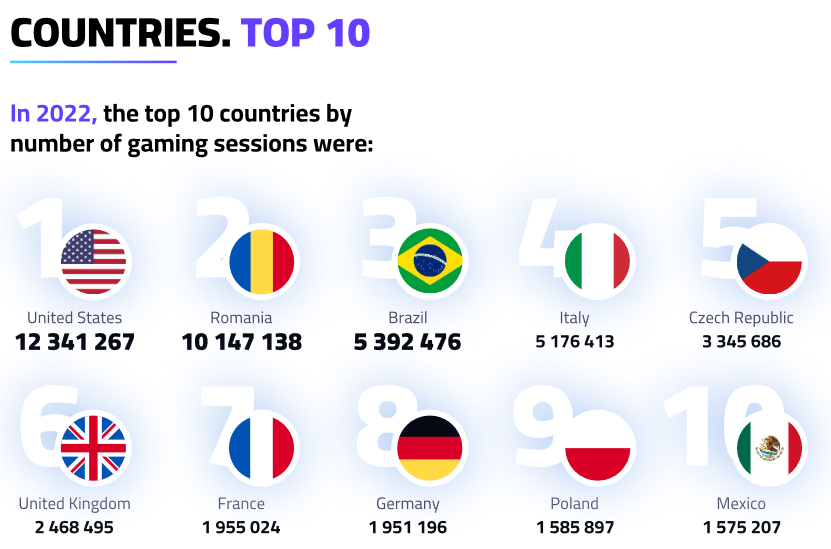
gg: Do you have any job openings right now? If so, what skills, knowledge or experience are needed?
Artem Skoryi: There are no job vacancies at the moment, but they come up from time to time. The most common ones are developers and testers. We are upgrading our hardware and introducing new features, so we periodically need developers and testers who will directly carry out development, product improvement and testing.
gg: Do you plan to add a free trial, for example for a couple of days?
Artem Skoryi: We are not considering it at this stage. We tried running similar versions when users could buy two days of access for 99 cents. Unfortunately, we were not satisfied with the results. At this stage of development all those who are now users of such services understand what they are turning to cloud gaming for and are not interested in trial versions.
gg: You have 2 tariffs: Ultimate and Start - what is the difference?
Artem Skoryi: The only difference between them is that Start is a monthly subscription and Ultimate is an annual subscription.
gg: What are the most popular games on Boosteroid?
Artem Skoryi: The trend is the same as in regular gaming. Of course it depends on players' preferences and each individual country, but right now the three most popular genres are action, adventure and role-playing games.
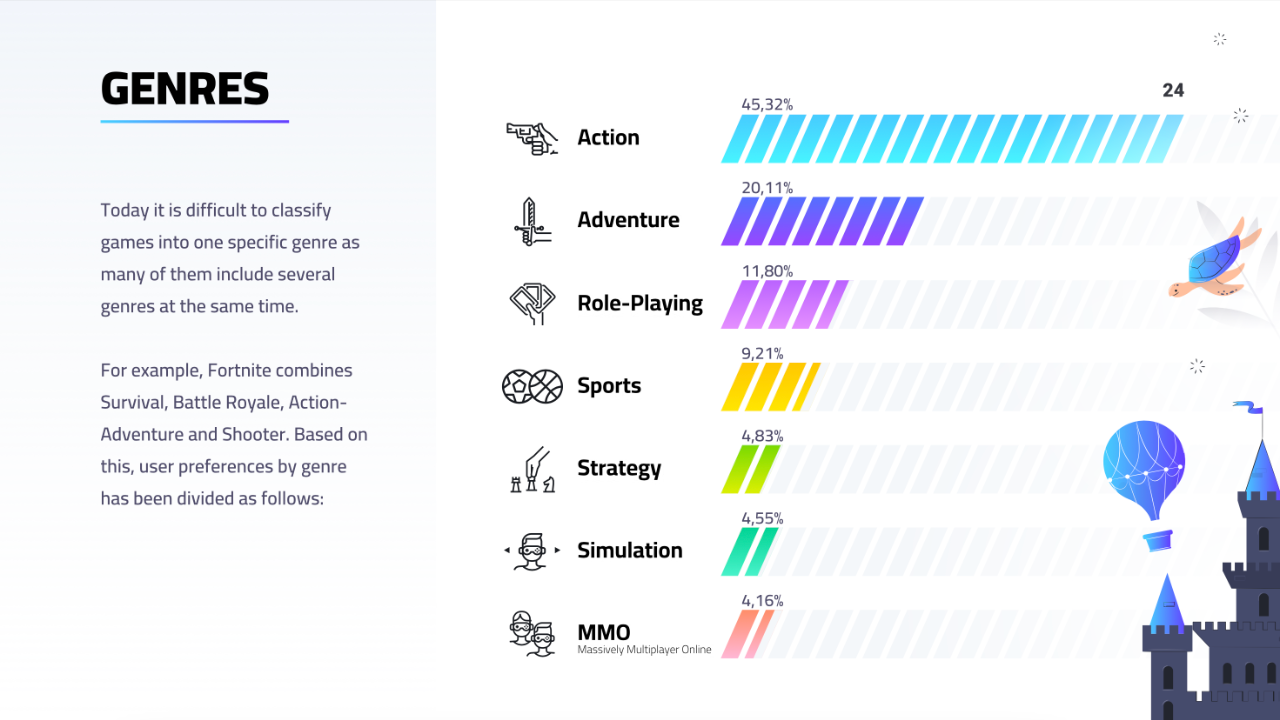
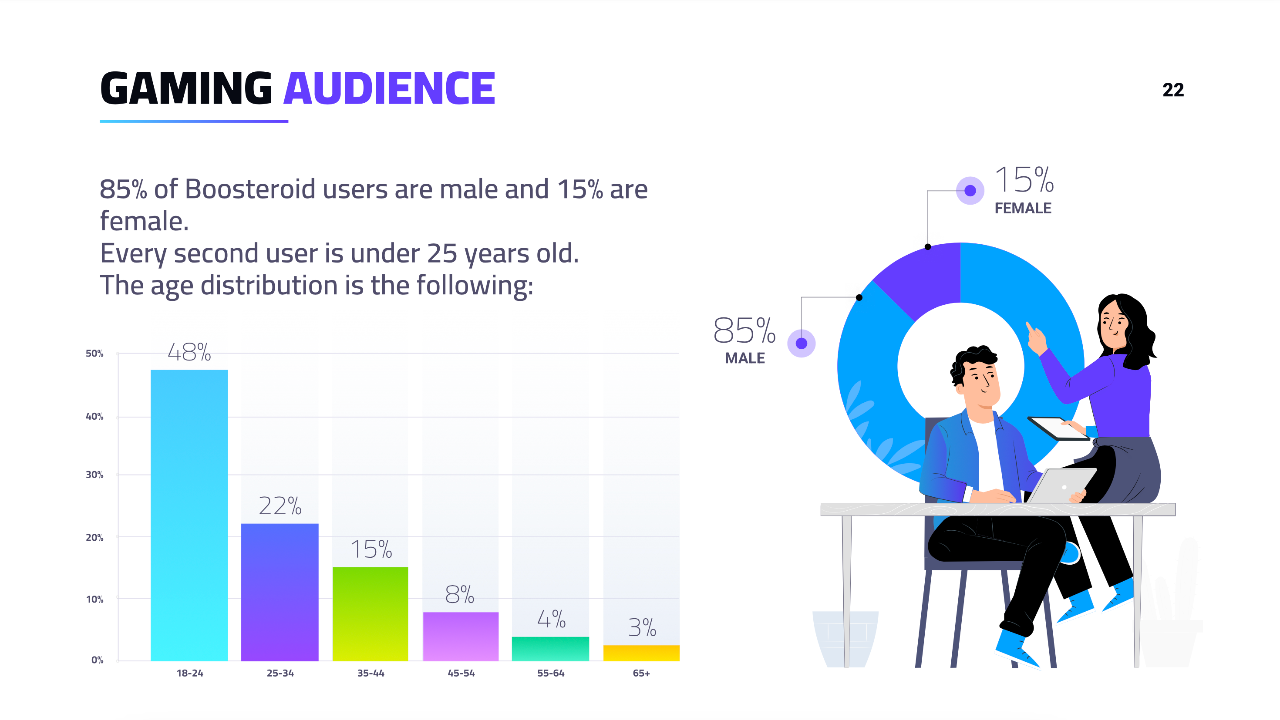
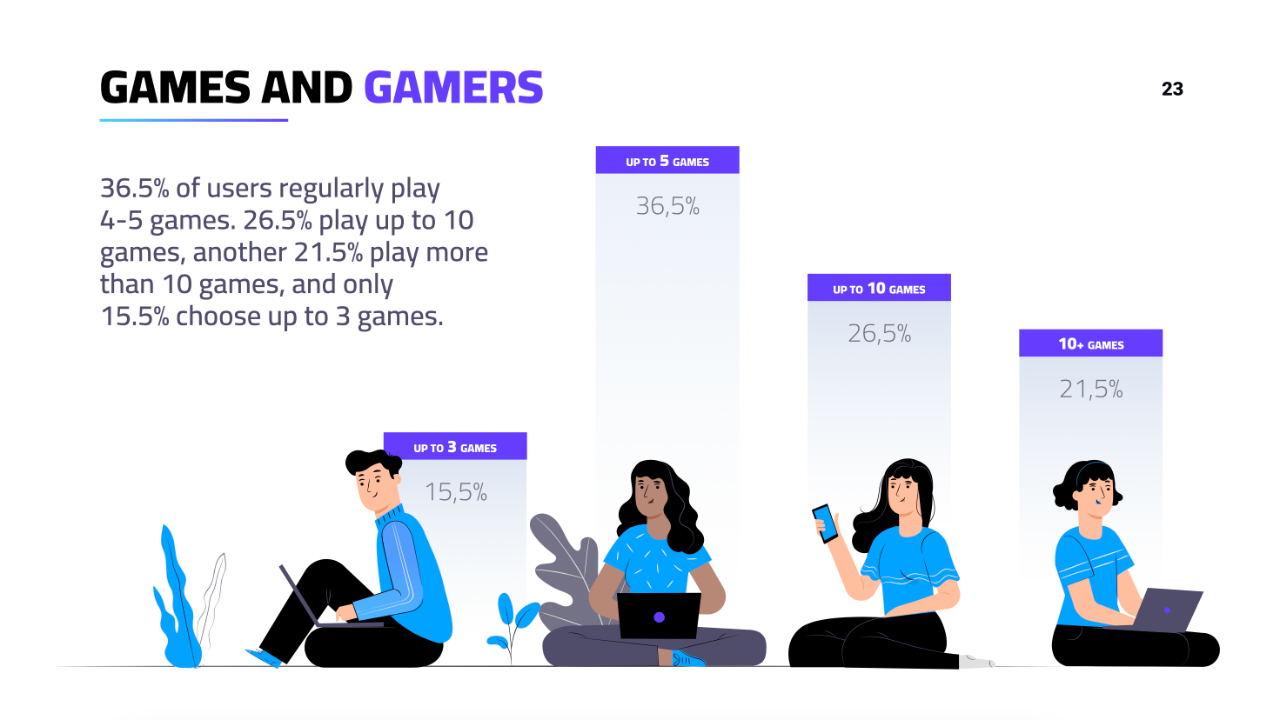

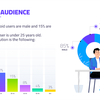
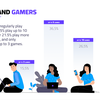
Company statistics for 2022: the most popular genres among players (Action games are the leader), every second user is under 25 years old and with a few exceptions Boosteroid users play more than 3 games.
For those who want to know more: Boosteroid records in 2022
- 2,765,395,168 hours were spent by players on the service. This equals 5,258 years.
- 2835 hours or 3 months, 29 days, 3 hours, 9 minutes and 46 seconds have been spent on Boosteroid by Drobeta-Turnu Severin from Romania. He played an average of 10 hours a day and is an avid fan of one game.
- 145 games, a third of them free, on the account of one user from Sweden. He plays through a native client, but spends every third session in a browser.
gg: What advertising tools do you use for promotion?
Vladyslav Kosmin: We rely on the organic growth of the audience now. We don't make some firm marketing steps, but we are thinking over it, because we have to attract the audience, which doesn't play games. We need to explain how cloud gaming works. So for now we are analyzing how to communicate with such an audience.
gg: What are the future plans of Boosteroid?
Vladyslav Kosmin: We want to open an office in the USA after the war. It does not mean we all will move there and the business will move there - no. The company and the project will always remain Ukrainian, but for the purpose of cooperation with partners and further business development it will be strategically important to open an office in the United States.
